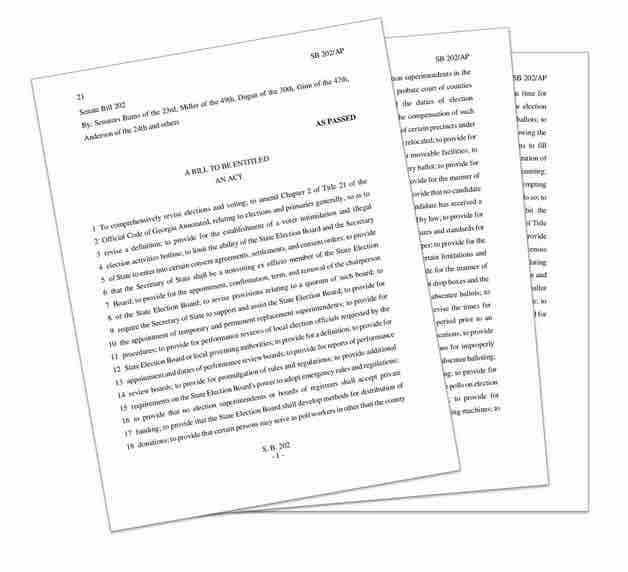Go page by page through Georgia’s new voting law, and one takeaway stands above all others: The Republican legislature and governor have made a breathtaking assertion of partisan power in elections, making absentee voting harder and creating restrictions and complications in the wake of narrow losses to Democrats.
The New York Times has examined and annotated the law, identifying 16 provisions that hamper the right to vote for some Georgians or strip power from state and local elections officials and give it to legislators.
Republicans passed and signed the 98-page voting law last week following the first Democratic victories in presidential and Senate elections in Georgia in a generation. President Biden won the state by just 11,779 votes out of nearly five million cast. The new law will, in particular, curtail ballot access for voters in booming urban and suburban counties, home to many Democrats. Another provision makes it a crime to offer water to voters waiting in lines, which tend to be longer in densely populated communities.
Below is The Times’s analysis of the law, including the specific provisions and some struck-through language from the state’s previous voting legislation.
Georgia’s Election Law, and Why Turnout Isn’t Easy to Turn Off
American Airlines and Dell Push Back Against Restricting Voter Access In Texas.
Delta and Coca-Cola Reverse Course on Georgia Voting Law, Stating ‘Crystal Clear’ Opposition
Opinion: What are Georgia Republicans afraid of?
Opinion: A scorching reply to Georgia’s vile new voting law unmasks a big GOP lie
HP, Dow, Under Armour Among Nearly 200 Companies Speaking Out Against Voting Law Changes in Texas, Other States
What would have happened if the Georgia secretary of state, Brad Raffensperger, had responded, “OK, I’ll try,” in a January phone call after President Trump asked him to “find” 11,000 votes?
No one can be sure. What is clear is that the question has been overlooked in recent months. Public attention has mostly moved on from Mr. Trump’s bid to overturn the election; activists and politicians are focused more on whether to restrict or expand voting access, particularly by mail.
But trying to reverse an election result without credible evidence of widespread fraud is an act of a different magnitude than narrowing access. A successful effort to subvert an election would pose grave and fundamental risks to democracy, risking political violence and secessionism.
Beyond any provisions on voting itself, the new Georgia election law risks making election subversion easier. It creates new avenues for partisan interference in election administration. This includes allowing the state elections board, now newly controlled by appointees of the Republican State Legislature, to appoint a single person to take control of typically bipartisan county election boards, which have important power over vote counting and voter eligibility.
The law also gives the Legislature the authority to appoint the chair of the state election board and two more of its five voting members, allowing it to appoint a majority of the board. It strips the secretary of state of the chair and a vote.
Even without this law, there would still be a risk of election subversion: Election officials and administrators all over the country possess important powers, including certification of election results, that could be abused in pursuit of partisan gain. And it’s a risk that H.R. 1, the reform bill congressional Democrats are pushing, does relatively little to address.
Georgia’s New Law, and the Risk of Election Subversion
The new Georgia law does not inherently make it easier to “find” 11,000 votes. Almost all of the powers that the Legislature might use already existed — they were just vested in other people or bodies. They could have been abused before and could be in the future, regardless of the new law.




